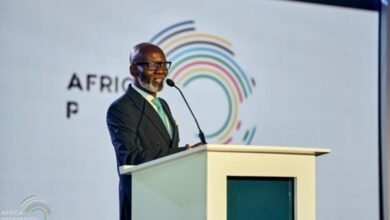Africans want to tell their own stories, to reveal their vision of the world on the big screen, but they still need to be spotted, produced and broadcast. This is the struggle of Leïla Chaïbi, a Franco-Algerian director who has lived in Tunisia and champions North-South cinema.
By Mérième Alaoui
Read more : Leïla Chaïbi: « Cinema seeing revival in Africa with documentary screenwritingShe is Franco-Algerian but also in a way Tunisian. « I lived there for years, and both my parents have very strong ties with this country, for different reasons, » Leïla Chaïbi, 40, says in low voice. It’s not surprising that this director found her inspiration in the land of jasmine. After an acclaimed documentary, “The Lock,” her latest film, “Guardian of the Worlds” is in competition this fall at the prestigious Carthage Film Festival (JCC). But also, at the Arab Film Festival in Fameck and at the Mediterranean Film Festival Cinémed in Montpellier.
Her poetic documentary, beautifully filmed, tells the story of Hassan, a cemetery guardian in the Jellaz hills in Tunisia. « He is what we call a pauper who has chosen to live with the dead. He navigates between the world of the living and that of the dead, in search of freedom. A depiction of solitude in these modern times. These three simultaneous selections are already beautiful recognition from the world of cinema, a confirmation highly prized by her peers. « Hundreds and hundreds of films are sent in for each festival, then there are pre-selections. For me, just being in the final competition is already a victory » she says.
Behind this spotlight the festival offers, there is a whole business interest
Because behind this spotlight that the festival offers, there is a whole business interest. The objective is to be spotted by a broadcaster for a purchase on television, or by a distributor for a possible release in theaters. This is quite a gamble, considering that Leïla’s film cost 150,000 euros, for example, and that she spent about five years working on it.
After studying film, the director found herself working as a video reporter for French public television on the island of Reunion. « During those three years, I learned the job on the ground. » Then North Africa called her, she left to try her luck in this land that attracts her so much. She joined Nessma TV in Tunis and entered the network of Tunisian directors and producers. « A very rich production, which develops several styles. It is no coincidence that the successful Maghreb horror film, « Dachra », is Tunisian.

Very quickly Leïla wanted to tell her own stories. She landed a writing residency under the Africadoc program organized each year by the Tënk coproduction meetings in Saint-Louis, Senegal. A perfect setting for someone who believes in co-productions between the North and the South. In Africa, the largest festivals targeted are Fespaco, the JCC in Carthage or the Durban International Film Festival in South Africa.
She participates in several projects with African colleagues. She first mentions Guinean Souleymane Diallo’s film « the Cemetery of Cinema,” where she was in charge of the image. The film tells the personal journey of the director who goes in search of the lost film of Mouramani. The very first film made by an African in 1953, but that nobody has seen. His quest, in which he takes stock of his country’s cinemas, takes him to France, to navigate the colonial history between these two countries.
The documentary film « offers a new look, which defends an African subject. And it is less expensive than a fiction film »
Selected, among others, at the Venice Film Festival, it walked away with four awards. It was also broadcast on the French-German channel Arte. This was precious for the one who could not benefit from his country’s help. Guinea does not have a fund for cinema. « Cinema is seeing a revival in Africa with the writing of documentaries. It offers a new look that defends an African purpose. And then it costs less than to jump into a fiction, » says Leïla.
She, who makes it a point of honor to work meticulously on each frame, considers the camera and the cinema as simple tools. « To build links. And to speak on behalf of others, tell their stories ». With a group of professionals from the Maghreb and France, she created the association La Lucarne. « We have several activities: we accompany children who make their own film. But we also have collaborative audiovisual projects.” Equally ambitious projects that, one day, may find their way in festivals.






